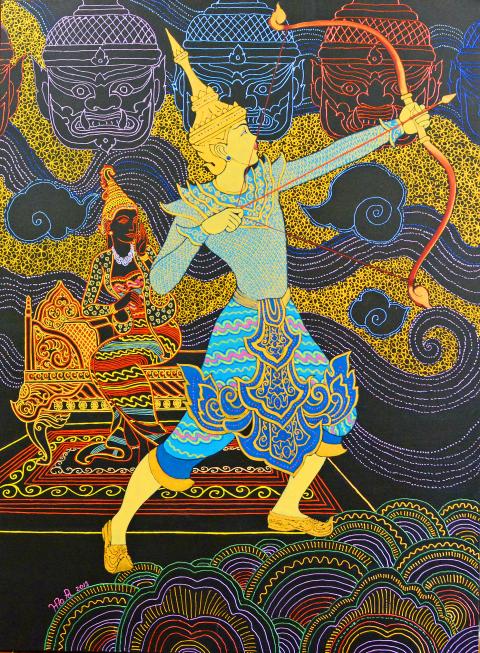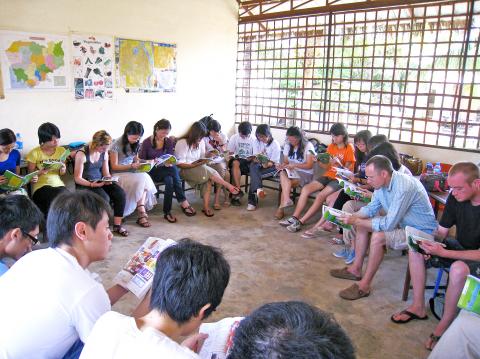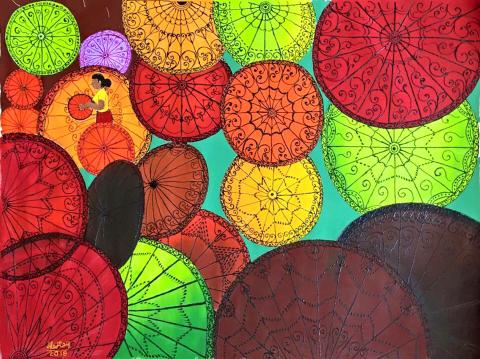Ian Holliday says the jailing of two Reuters reporters investigating the deaths of 10 Rohinga by security forces has become a public relations disaster for Aung San Suu Kyi and the National League for Democracy (NLD) and doesn’t bode well for the future of Myanmar’s liberalization.
“She’s boxed herself into a corner,” Holliday, the vice-president of the University of Hong Kong (Teaching and Learning) and a Myanmar specialist, tells the Taipei Times. “The rule of law has always been her mantra, and she’s said this case is strictly for the courts. Once she’s taken a position, she’s extremely reluctant to change her mind. Here she’s said publicly that the journalists were jailed because the courts decided they broke the law. She’s also said their conviction has nothing to do with freedom of expression.”
Holliday will be in Taipei on Saturday when he will give a lecture, Liberalism and Democracy in Myanmar, as part of the Lung Ying-tai Cultural Foundation’s Taipei Salon series of talks by international speakers. Lung Ying-tai (龍應台), former culture minister and a professor at Hong Kong University, will moderate the talk.

Photo courtesy of Thukhuma Collection, thukhuma.org
DOMESTIC PRESSURE
The case highlights the extreme pressure at home and abroad that Aung San Suu Kyi is under as she continues to implement reforms. In addition to international pressure, she is aware that the military could tire of politicians and assume full power again.
“The 2008 constitution has an entire chapter on provisions for a state of emergency, which allows for a military takeover if national solidarity or national sovereignty are threatened,” Holliday says.

Photo Courtesy of Ian Holliday
But a “power grab” by the military is unlikely, he adds, because sharing power with the NLD has worked out very well for the generals. Which raises a question: can she use her, admittedly diminishing, moral authority and work behind the scenes to free the journalists and deal with the Rohinga crisis?
“Maybe she tried and failed — we don’t know. Taking a public stand against the military on the Rohingya issue would be immensely courageous — and politically suicidal, given that the Myanmar people are strongly anti-Rohingya,” Holliday says.
‘LIMITED LIBERALISM’

Photo courtesy of Thukhuma Collection, thukhuma.org
Holliday’s talk will examine Myanmar’s prospects for liberal democracy, a process that involves examining the experience of democratic consolidation in other countries, drawing on their historical legacies, constitutional provisions, key actors and commitment to dealing with an authoritarian past.
“Myanmar has a political culture that is partly liberal, partly illiberal and partly limited liberal — meaning that on some issues people hold inconsistent beliefs. They may think that democracy is good, but so too is military rule. They may hold that political rights should be exercised by all, but not by the Rohingya,” he says.
Holliday adds that the numbers of liberals in the country have stagnated, while those with illiberal and limited liberal beliefs are growing. “In these circumstances, a hybrid regime devised by former military rulers, in which power is shared between an elected government and an entrenched military machine, seems likely to remain in place for some time to come,” he says. “There could even be a slide back into autocracy.”
The talk will conclude ways to strengthen Myanmar’s democracy.
ART AND EDUCATION
For Holliday, Myanmar is more than just an academic interest. While traveling in Thailand in December 2007 to help displaced populations, he visited a number of schools on the Thai-Myanmar border and learned that their students needed help with English. The following summer he launched the Migrant Outreach Education Initiative program, which saw 22 students from University of Hong Kong travel to Thailand to deliver six weeks of intensive English classes to 700 refugees and migrants in 11 schools.
The following year they started a program in Cambodia and in 2011 another in Myanmar. They’ve also offered programs in China.
“Teachers get a chance to engage in meaningful service learning. Many of them form a strong bond with their students and return to teach again in their schools,” he said, adding that the goal is to help students develop confidence with English.
Holliday also has one of the world’s largest collections of art from Myanmar — over 1,000 works by over 100 artists. He began collecting in 2010 when the country was transitioning from military rule to a quasi-democracy.
In an interview last summer with ArtAsiaPacific, Holliday said that before the transition he couldn’t do scientific research in the country — “all you could do was sniff the air,” he told the art magazine.
Holliday said that political civil society and artistic civil society often overlapped because they were so small.
“If you sat down with civil-society leaders, you were often talking to painters,” he said.
Holliday’s motivation to collect art, which predominately consists of paintings, was that he wanted another view into the psyche of a population that is representing their ideas after 50 of military rule.
“After such a long period of isolation, people want the country to succeed and come back into the embrace of the modern world. But that’s only going to happen if we do that on a basis of understanding rather than ignorance. There are multiple ways we can do it, and I believe paintings are one way,” Holliday said.
His collection, which he eventually plans to donate to an institution, has enabled Myanmar art to reach a broader audience with traveling shows to the US and UK.
And what of the Reuters journalists?
“I think that eventually the appeal will have to find in favor of the journalists, or there will have to be a presidential pardon — everyone knows this is an issue Myanmar has to resolve if it’s to continue with its rehabilitation in international society. Media freedom is worse under the NLD than it was under the [Union Solidarity and Development Party] — that’s not likely to change,” he says.

Three big changes have transformed the landscape of Taiwan’s local patronage factions: Increasing Democratic Progressive Party (DPP) involvement, rising new factions and the Chinese Nationalist Party’s (KMT) significantly weakened control. GREEN FACTIONS It is said that “south of the Zhuoshui River (濁水溪), there is no blue-green divide,” meaning that from Yunlin County south there is no difference between KMT and DPP politicians. This is not always true, but there is more than a grain of truth to it. Traditionally, DPP factions are viewed as national entities, with their primary function to secure plum positions in the party and government. This is not unusual

More than 75 years after the publication of Nineteen Eighty-Four, the Orwellian phrase “Big Brother is watching you” has become so familiar to most of the Taiwanese public that even those who haven’t read the novel recognize it. That phrase has now been given a new look by amateur translator Tsiu Ing-sing (周盈成), who recently completed the first full Taiwanese translation of George Orwell’s dystopian classic. Tsiu — who completed the nearly 160,000-word project in his spare time over four years — said his goal was to “prove it possible” that foreign literature could be rendered in Taiwanese. The translation is part of

Mongolian influencer Anudari Daarya looks effortlessly glamorous and carefree in her social media posts — but the classically trained pianist’s road to acceptance as a transgender artist has been anything but easy. She is one of a growing number of Mongolian LGBTQ youth challenging stereotypes and fighting for acceptance through media representation in the socially conservative country. LGBTQ Mongolians often hide their identities from their employers and colleagues for fear of discrimination, with a survey by the non-profit LGBT Centre Mongolia showing that only 20 percent of people felt comfortable coming out at work. Daarya, 25, said she has faced discrimination since she

The other day, a friend decided to playfully name our individual roles within the group: planner, emotional support, and so on. I was the fault-finder — or, as she put it, “the grumpy teenager” — who points out problems, but doesn’t suggest alternatives. She was only kidding around, but she struck at an insecurity I have: that I’m unacceptably, intolerably negative. My first instinct is to stress-test ideas for potential flaws. This critical tendency serves me well professionally, and feels true to who I am. If I don’t enjoy a film, for example, I don’t swallow my opinion. But I sometimes worry